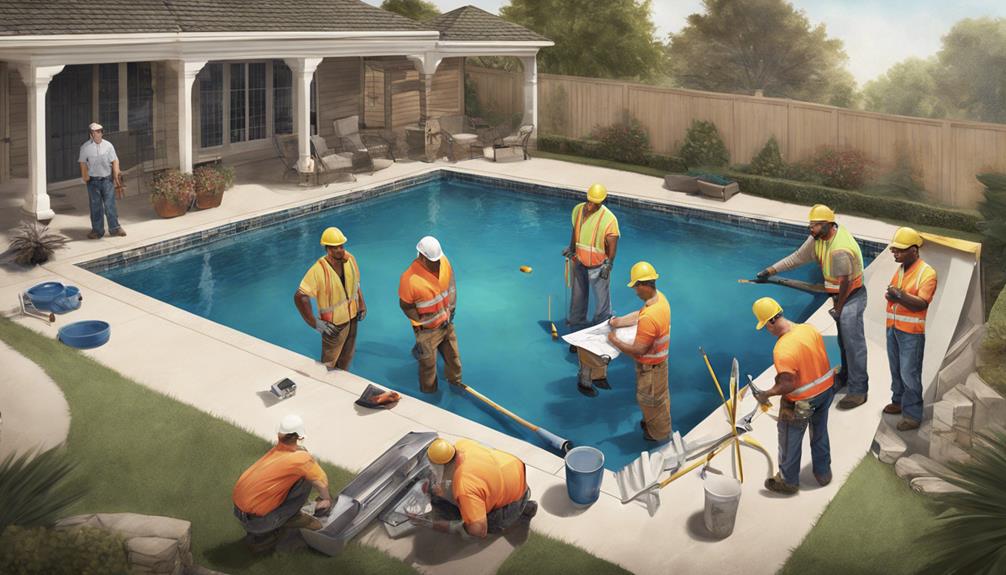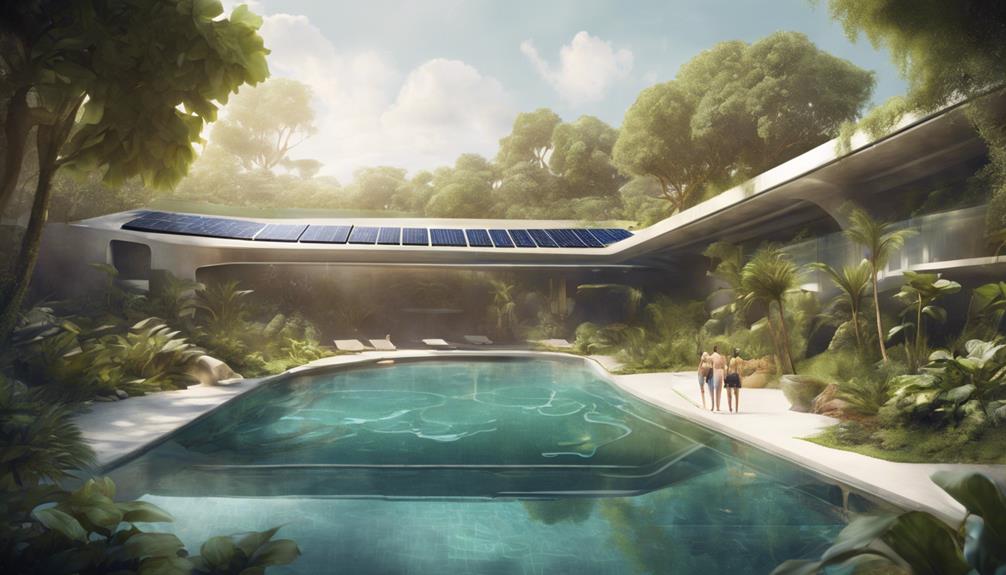Discover the range of advantages offered by saltwater pools, including cost efficiency thanks to reduced maintenance expenses. With simplified upkeep and improved safety, they eliminate the need for manual chlorine additions, making maintenance hassle-free. By utilizing a generator cell to leverage the benefits of chlorine, they consistently maintain ideal disinfection levels. In terms of health, saltwater pools are gentle on sensitive skin, eyes, and respiratory systems, providing a more comfortable experience. By embracing eco-conscious practices, these pools are environmentally friendly and require fewer chemicals, aligning with sustainability trends. Delve deeper into the benefits to fully understand the value that saltwater pools bring to pool ownership.
Key Takeaways
- Saltwater pools offer simplified maintenance with continuous chlorine generation.
- Healthier and more comfortable swimming experience due to gentle environment.
- Reduced chemical exposure and lower chlorine concentrations enhance safety.
- Environmental friendliness with lower chemical dependence and sustainable practices.
- Cost savings over time despite higher initial installation expenses.
Cost Comparison and Savings
When comparing the costs between saltwater pools and traditional chlorine pools, the initial installation expenses of a saltwater pool system are typically 2-4 times higher. While this upfront cost may seem significant, savings can be seen in the long run.
Saltwater pools reduce the need for chlorine pucks and other chemicals, decreasing maintenance costs. Additionally, existing chlorine pools can be converted to saltwater pools, with the special generator adaptation costing approximately three years' worth of chlorine chemicals.
It is essential to take into account that saltwater pools require monitoring for potential corrosion of pool fixtures and the pool interior over time. Despite the higher initial investment, the cost savings and benefits of owning a saltwater pool make it a compelling option for many pool owners.
Simplified Maintenance and Safety
Comparing the maintenance requirements and safety aspects of saltwater pools to traditional chlorine pools reveals significant advantages for owners of saltwater pool systems. Saltwater pools offer simplified maintenance due to the continuous generation of chlorine through a generator cell, which eliminates the need for manual addition of chlorine. With chlorine levels consistently replenishing themselves, saltwater pools require lower amounts of chlorine for disinfection compared to traditional pools.
Additionally, monitoring pH levels and testing chlorine regularly are the primary maintenance tasks for saltwater pools. Regarding safety, saltwater pools reduce the risk of chemical exposure since they have lower chlorine concentrations. This makes them a safer option for families, especially households with children and pets.
Chlorine Benefits in Saltwater Pools

Saltwater pools harness the benefits of chlorine as a disinfectant through a continuous generation process using a generator cell. Chlorine in saltwater pools breaks down harmful by-products and constantly regenerates, preventing the buildup of chloramines.
The chlorine levels in saltwater pools constantly replenish themselves, maintaining a consistent disinfecting environment. Unlike traditional chlorine pools where chlorine needs to be manually added and monitored, saltwater pools offer a more automated and controlled chlorine production system.
Additionally, saltwater pools use lower amounts of chlorine compared to conventional pools, which can be beneficial for those sensitive to high chlorine levels. This efficient use of chlorine in saltwater pools contributes to a more balanced and stable pool environment.
Health Benefits for Users
Harnessing the positive impact of saltwater pools on users' health, these pools offer a more natural and gentle environment that benefits individuals with allergies, sensitivities, and overall well-being.
The balanced pH levels in saltwater pools provide a more natural feel, making them gentler on hair, skin, and nails compared to traditional chlorine pools. Additionally, saltwater pools help reduce eye irritation and eliminate the strong chemical odor often associated with chlorine pools.
Allergy sufferers and asthmatics can find relief in saltwater pools, as they are less harsh on the respiratory system. By promoting a healthier and more comfortable swimming experience, saltwater pools contribute to the overall well-being of their users.
Environmental Friendliness

An increasing number of pool owners are recognizing the eco-friendly advantages of saltwater pools in reducing the use of harsh chemicals and promoting environmental sustainability.
Saltwater pools are considered more environmentally friendly than traditional chlorine pools due to their lower dependence on chemical additives. By utilizing a saltwater chlorine generator system, these pools produce chlorine from salt, eliminating the need for frequent chemical additions. This not only reduces the potential harm caused by excessive chemical use but also minimizes the release of harmful by-products into the environment.
Additionally, saltwater pools require fewer chemicals for maintenance, contributing to a cleaner and more sustainable swimming experience. Overall, the shift towards saltwater pools aligns with a growing concern for eco-conscious practices in pool ownership.
Frequently Asked Questions
Can I Swim in a Saltwater Pool if I Have Sensitive Skin?
Individuals with sensitive skin can often swim in saltwater pools as they typically have lower chlorine levels, reducing skin irritation. Saltwater pools are known to be gentler on skin, hair, and nails, making them a suitable option for those with skin sensitivities.
Are There Any Specific Types of Salt Recommended for Saltwater Pools?
When considering salt for saltwater pools, it's essential to choose high-purity salt without iodine or anti-caking agents. Solar salt or evaporated salt are common choices due to their purity. Always consult with a pool professional for specific recommendations.
How Often Should I Clean the Saltwater Pool Generator Cell?
Regular maintenance of the saltwater pool generator cell is essential. Cleaning should occur every 3-6 months, depending on usage. Follow manufacturer guidelines for proper cleaning procedures to ensure peak performance and longevity of the generator.
Can I Use Regular Pool Cleaning Tools for a Saltwater Pool?
Regular pool cleaning tools can be used for saltwater pools. However, consider materials that are resistant to corrosion caused by salt. Maintenance tools should be compatible with saltwater conditions to guarantee effective cleaning without damaging the pool.
How Does Saltwater Affect Pool Toys and Inflatables?
Saltwater in pools can corrode certain materials in pool toys and inflatables over time due to its chlorine content. It's advisable to use saltwater-resistant pool toys or rinse them thoroughly with freshwater after use to prevent damage.
Can Saltwater Pools Enhance My Fitness Workout Routine?
Saltwater pools can definitely enhance your fitness routine. The buoyancy of the water can reduce impact on joints, making it ideal for varied pool workouts for fitness. The resistance of the water also helps build strength and endurance, providing a challenging yet low-impact option for exercise.
Conclusion
To wrap up, the allure of saltwater pools is undeniable, with their promise of cost savings, simplified maintenance, and health benefits.
However, as we delve further into the world of saltwater pools, it becomes apparent that the salt's corrosive nature may ironically erode the very fixtures we seek to enjoy.
Despite this, the environmental friendliness and chlorine benefits make saltwater pools a compelling option for those willing to navigate the salty waters of pool ownership.










